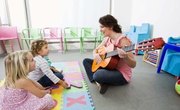According to the American Psychological Association, research shows that boys and girls learn differently. The findings can explain increased number of public schools that have joined their private counterparts to offer education in separate gender classes. In spite of extensive research on the effects of separated classes, the issue continues to attract political, socioeconomic and civil rights concerns. Some of the arguments for single-sex schools include academic achievement, discipline and reduced gender stereotypes.
Academic Achievement and Personal Development
Single-gender classes allow teachers to use gender-specific teaching techniques to enhance understanding of children according to their learning preferences. For example, teachers can use “brain breaks” or interactive instruction to enhance teaching language arts, especially for active boys. Teachers are also in a position to center on subjects and topics that are problematic such as theoretical instruction to enhance Math and Science understanding among girls. Students can also branch out to their areas of interest without seeking approval or impression of the opposite gender, which leads to greater personal development.
Discipline and Focus
Single-sex classes help reduce distractions from the opposite sex, increasing focus on the teacher and academics. Separation reduces cases of indiscipline that arise from interaction and peer pressure from the opposite sex. According to an article by Rena Philips at "All Alabama," girls are shy to ask questions in class in the presence of boys, and they consider boys to be boisterous, making it hard for them to concentrate. Teachers also argue that boys are uncomfortable reading journal entries aloud when girls are around. Discipline creates an effective learning environment that can spur academic achievement.
Personal Relationships
The biggest problem with single-sex classes, according to American Civil Liberties Union (ACLU), is that it does not promote social skills for opposite sex interaction. The larger society does not separate genders, and people should interact in all situations. Sex segregation denies children a chance to learn how to coexist well and work cooperatively with opposite sex members in society. Some children have also indicated that they enjoy learning together because it helps bring a balance in the learning environment. Proper interaction with the opposite sex can help children develop meaningful friendships, confidence in communication and adaptability to different settings.
Gender Stereotypes and Discrimination
Separate gender classes is akin to rewriting gender stereotypes, according to critics. According to American Psychological Association, there is increased reinforcement of gender stereotypes when female and male students spend less time together. It creates a notion that girls and boys are different in ability, educational needs or careers. Separation increases tension between children of different sexes as they avoid playing together. For instance, when girls learn in different classes because they are shy, they get a life message that when boys are around they should be shy or fearful and that boys are rowdy. In addition, different teaching programs can lead to inequality in education.
Related Articles
References
Writer Bio
Maria OCadiz has been writing professionally since 1982, most recently publishing for various websites on topics like health and wellness, and education. She holds a Master of Arts in Education. She is a former university professor, curriculum facilitator and teacher.











